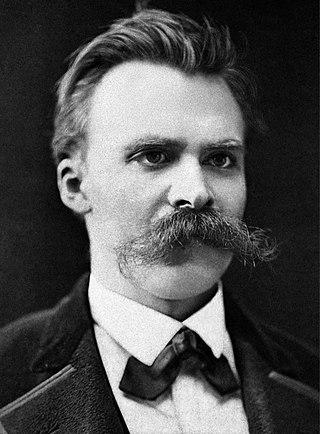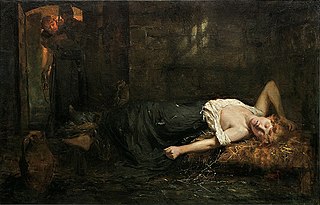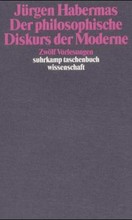Egoism is a philosophy concerned with the role of the self, or ego, as the motivation and goal of one's own action. Different theories of egoism encompass a range of disparate ideas and can generally be categorized into descriptive or normative forms. That is, they may be interested in either describing that people do act in self-interest or prescribing that they should. Other definitions of egoism may instead emphasise action according to one's will rather than one's self-interest, and furthermore posit that this is a truer sense of egoism.

Friedrich Wilhelm Nietzsche was a German philosopher, prose poet, cultural critic, philologist, and composer whose work has exerted a profound influence on contemporary philosophy. He began his career as a classical philologist before turning to philosophy. He became the youngest person ever to hold the Chair of Classical Philology at the University of Basel in 1869 at the age of 24. Nietzsche resigned in 1879 due to health problems that plagued him most of his life; he completed much of his core writing in the following decade. In 1889, at age 44, he suffered a collapse and afterward a complete loss of his mental faculties, with paralysis and probably vascular dementia. He lived his remaining years in the care of his mother until her death in 1897 and then with his sister Elisabeth Förster-Nietzsche. Nietzsche died in 1900, after experiencing pneumonia and multiple strokes.

Nihilism is a philosophy, or family of views within philosophy, that rejects generally accepted or fundamental aspects of human existence, such as objective truth, knowledge, morality, values, or meaning. The term was popularized by Ivan Turgenev, and more specifically by his character Bazarov in the novel Fathers and Sons.
Postmodern philosophy is a philosophical movement that arose in the second half of the 20th century as a critical response to assumptions allegedly present in modernist philosophical ideas regarding culture, identity, history, or language that were developed during the 18th-century Age of Enlightenment. Postmodernist thinkers developed concepts like difference, repetition, trace, and hyperreality to subvert "grand narratives", univocity of being, and epistemic certainty. Postmodern philosophy questions the importance of power relationships, personalization, and discourse in the "construction" of truth and world views. Many postmodernists appear to deny that an objective reality exists, and appear to deny that there are objective moral values.

Discourse is a generalization of the notion of a conversation to any form of communication. Discourse is a major topic in social theory, with work spanning fields such as sociology, anthropology, continental philosophy, and discourse analysis. Following pioneering work by Michel Foucault, these fields view discourse as a system of thought, knowledge, or communication that constructs our experience of the world. Since control of discourse amounts to control of how the world is perceived, social theory often studies discourse as a window into power. Within theoretical linguistics, discourse is understood more narrowly as linguistic information exchange and was one of the major motivations for the framework of dynamic semantics, in which expressions' denotations are equated with their ability to update a discourse context.

Paul-Michel Foucault was a French philosopher, historian of ideas, writer, political activist, and literary critic. Foucault's theories primarily address the relationship between power and knowledge, and how they are used as a form of social control through societal institutions. Though often cited as a structuralist and postmodernist, Foucault rejected these labels. His thought has influenced academics, especially those working in communication studies, anthropology, psychology, sociology, criminology, cultural studies, literary theory, feminism, Marxism and critical theory.

The History of Sexuality is a four-volume study of sexuality in the Western world by the French historian and philosopher Michel Foucault, in which the author examines the emergence of "sexuality" as a discursive object and separate sphere of life and argues that the notion that every individual has a sexuality is a relatively recent development in Western societies. The first volume, The Will to Knowledge, was first published in 1976; an English translation appeared in 1978. The Use of Pleasure, and The Care of the Self, were published in 1984. The fourth volume, Confessions of the Flesh, was published posthumously in 2018.
In philosophy, episteme is knowledge or understanding. The term epistemology is derived from episteme.
Perspectivism is the epistemological principle that perception of and knowledge of something are always bound to the interpretive perspectives of those observing it. While perspectivism does not regard all perspectives and interpretations as being of equal truth or value, it holds that no one has access to an absolute view of the world cut off from perspective. Instead, all such viewing occurs from some point of view which in turn affects how things are perceived. Rather than attempt to determine truth by correspondence to things outside any perspective, perspectivism thus generally seeks to determine truth by comparing and evaluating perspectives among themselves. Perspectivism may be regarded as an early form of epistemological pluralism, though in some accounts includes treatment of value theory, moral psychology, and realist metaphysics.
Hans D. Sluga is a German philosopher who spent most of his career as professor of philosophy at the University of California, Berkeley. Sluga teaches and writes on topics in the history of analytic philosophy, the history of continental philosophy, as well as on political theory, and ancient philosophy in Greece and China. He has been particularly influenced by the thought of Gottlob Frege, Ludwig Wittgenstein, Martin Heidegger, Friedrich Nietzsche, and Michel Foucault.
Discontinuity and continuity according to Michel Foucault reflect the flow of history and the fact that some "things are no longer perceived, described, expressed, characterised, classified, and known in the same way" from one era to the next. (1994).

In social theory and philosophy, antihumanism or anti-humanism is a theory that is critical of traditional humanism, traditional ideas about humanity and the human condition. Central to antihumanism is the view that philosophical anthropology and its concepts of "human nature", "man" or "humanity" should be rejected as historically relative, ideological or metaphysical.

The Order of Things: An Archaeology of the Human Sciences by French philosopher Michel Foucault proposes that every historical period has underlying epistemic assumptions, ways of thinking, which determine what is truth and what is acceptable discourse about a subject, by delineating the origins of biology, economics, and linguistics. The introduction to the origins of the human sciences begins with detailed, forensic analyses and discussion of the complex networks of sightlines, hidden-ness, and representation that exist in the group painting Las Meninas by Diego Velázquez. Foucault's application of the analyses shows the structural parallels in the similar developments in perception that occurred in researchers’ ways of seeing the subject in the human sciences.

The Apollonian and the Dionysian are philosophical and literary concepts represented by a duality between the figures of Apollo and Dionysus from Greek mythology. Its popularization is widely attributed to the work The Birth of Tragedy by Friedrich Nietzsche, though the terms had already been in use prior to this, such as in the writings of poet Friedrich Hölderlin, historian Johann Joachim Winckelmann, and others. The word Dionysian occurs as early as 1608 in Edward Topsell's zoological treatise The History of Serpents. The concept has since been widely invoked and discussed within Western philosophy and literature.

The Philosophical Discourse of Modernity: Twelve Lectures is a 1985 book by the philosopher Jürgen Habermas, in which the author reconstructs and deals in depth with a number of philosophical approaches to the critique of modern reason and the Enlightenment "project" since Georg Wilhelm Friedrich Hegel and Friedrich Nietzsche, including the work of 20th century philosophers Max Horkheimer, Theodor Adorno, Martin Heidegger, Michel Foucault, Jacques Derrida, Cornelius Castoriadis and Niklas Luhmann. The work is regarded as an important contribution to Frankfurt School critical theory. It has been characterized as a critical evaluation of the concept of world disclosure in modern philosophy.
This is a list of articles in continental philosophy.

On the Genealogy of Morality: A Polemic is an 1887 book by German philosopher Friedrich Nietzsche. It consists of a preface and three interrelated treatises that expand and follow through on concepts Nietzsche sketched out in Beyond Good and Evil (1886). The three treatises trace episodes in the evolution of moral concepts with a view to confronting "moral prejudices", specifically those of Christianity and Judaism.
This is a list of philosophical literature articles.
On the proposal of Jules Vuillemin, a chair in the department of Philosophy and History was created at Collège de France to replace the late Jean Hyppolite. The title of the new chair was The history of systems of thought and it was created on 30 November 1969. Vuillemin put forward the then-little known outside the shores of France-philosopher Michel Foucault - to the general assembly of professors and Foucault was duly elected on 12 April 1970. He was 44 years old. As required by this appointment he held a series of public lectures from 1970 until his death in 1984. These lectures in which he further advanced his work, were summarised from audio recordings and edited by Michel Senellart. They were subsequently translated into English and further edited by Graham Burchell and published posthumously by St Martin's Press.









